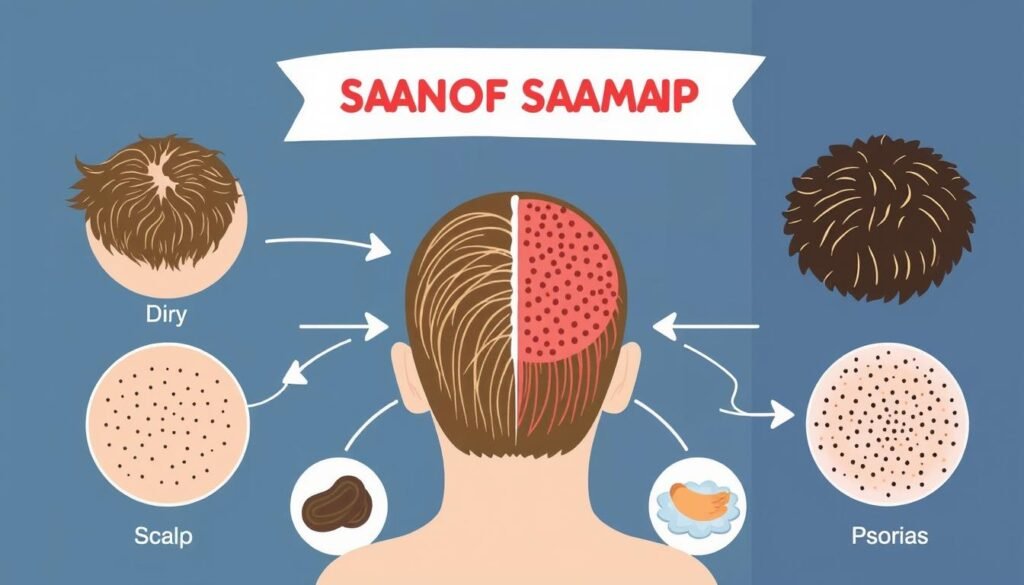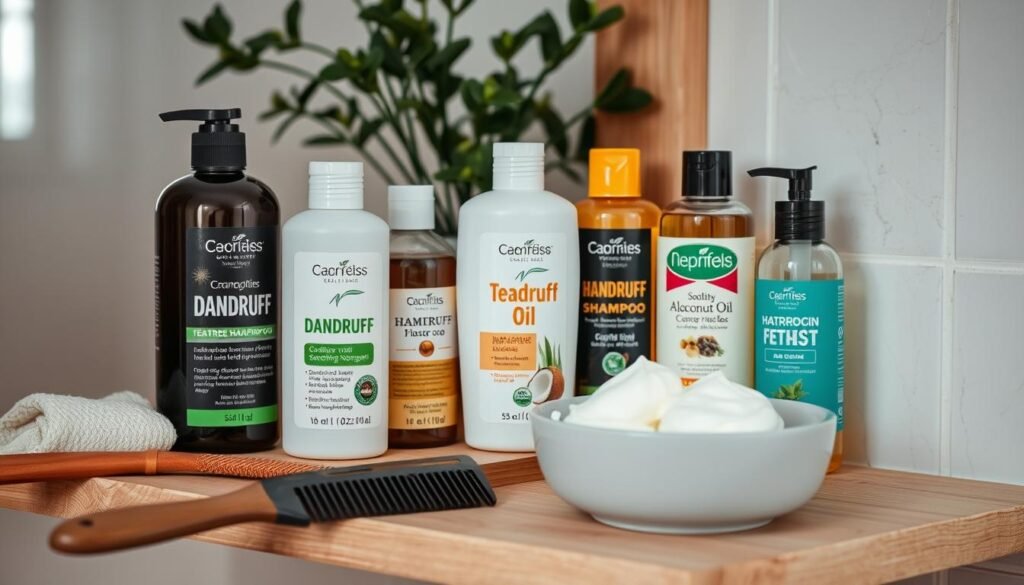Did you know half of all adults will have dandruff at some point? If you have moderate to severe dandruff, using anti-dandruff shampoo three times a week can help. This article will guide you through finding how often to use dandruff shampoo. We focus on keeping a healthy scalp and consider factors impacting your hair care routine.
Finding the right frequency for using dandruff shampoo is key to getting rid of flakes. Washing your hair every day might seem good but can make dandruff treatments less effective. It’s important to think about your hair type, how active you are, and if your scalp is sensitive. This way, you can create a plan that’s just right for you.
Key Takeaways
- Approximately 50% of adults experience dandruff in their lifetime.
- Using anti-dandruff shampoo three times a week can help individuals become flake-free.
- It’s essential to consider factors like hair type and lifestyle when determining shampoo frequency.
- Overusing other shampoos can reduce the effectiveness of anti-dandruff treatments.
- Maintaining scalp health is critical for effective dandruff management.
Understanding Dandruff and Its Causes
Dandruff affects about half of the adult population worldwide. It shows as a flaky scalp and an itchy scalp. This issue is common and often not well-understood. More men get dandruff compared to women. Symptoms usually start in puberty and can last a lifetime.
The main reason for dandruff is too much of a yeast-like fungus called Malassezia. This fungus lives on the oils of the scalp, which can lead to irritation and flaking. Other dandruff causes are dry skin, reactions to hair products, and conditions like seborrheic dermatitis.
Those with oilier hair or certain health issues like Parkinson’s disease, HIV, or weaker immune systems are more likely to get dandruff. Finding the root cause is crucial for proper control. Dandruff is not just a physical issue. It can get worse with stress, linking emotional well-being to scalp health.
Weather also affects dandruff, especially in cold and dry times. These changes show the need for regular scalp care and the right shampooing method.
| Factors Contributing to Dandruff | Description |
|---|---|
| Malassezia Overgrowth | A fungus that irritates the scalp and contributes to flaking. |
| Dry Skin | Can lead to a flaky scalp, often mistaken for dandruff. |
| Product Sensitivity | Reactions to certain hair products can trigger itching and dandruff. |
| Seasonal Changes | Dandruff flares can occur in cold, dry weather conditions. |
| Emotional Stress | Increased stress levels can worsen dandruff symptoms. |
Knowing the different dandruff causes is vital for effective treatment. For ongoing issues, seeing a dermatologist or medical expert is recommended for a personalized approach.
The Importance of Scalp Health
A healthy scalp is key to great hair. Ignoring scalp care can result in dandruff, itching, and losing hair. It’s essential to have a hair care routine that focuses on keeping the scalp healthy. This is important for anyone wanting to keep their hair looking good.
First, know your scalp type. Using the right products is very important. For oily scalps, gentle, sulfate-free shampoos are best. They don’t remove natural oils. Dry scalps, on the other hand, might need moisturizing shampoos and deep-conditioning treatments.
Adding treatments like special anti-dandruff shampoos can clear up irritants and fungi. This creates a healthy scalp environment. It’s also important to constantly tackle issues like scalp psoriasis or atopic dermatitis. Ingredients such as salicylic acid or tar can help ease these conditions.
Regularly washing your scalp gets rid of dead skin and boosts hair growth. Products with antifungal ingredients, like Piroctone Olamine, reduce hair fall and better scalp health. A clean scalp helps approximately 100,000 hair follicles grow hair effectively.
Having a solid hair care routine that includes scalp care results in healthier, stronger hair. Understanding what your hair needs can greatly improve hair health.
How Often Should You Use Dandruff Shampoo
Dandruff shampoo is key for treating scalp issues. The usage frequency depends on your scalp’s health and dandruff’s severity. Finding the optimal frequency is crucial for the best results.
Factors Influencing Usage Frequency
Certain factors determine how often to use anti-dandruff shampoos:
- Mild dandruff may need a once or twice weekly treatment. More severe cases require more frequent use.
- Those with dry hair should use it less often, incorporating a moisturizing conditioner.
- The type of shampoo matters too, especially for specific scalp conditions.
Types of Dandruff
Knowing the types of dandruff helps tailor your treatment:
| Type of Dandruff | Characteristics | Recommended Treatment Frequency |
|---|---|---|
| Dry Dandruff | White, flaky, linked to dry skin. | 1-2 times per week |
| Oily Dandruff | Greasy flakes stick to scalp and hair. | 2-3 times per week |
Picking the right shampoo is vital. Ingredients like selenium sulfide, pyrithione zinc, and ketoconazole can really help. Consistently using it promotes not just dandruff control but overall scalp health too.
Choosing the Right Anti-Dandruff Shampoo
Finding the right anti-dandruff shampoo is key. Many options exist, each with specific ingredients. The market has medicated shampoos for serious cases and gentler ones for slight dandruff. This allows people to pick what best fits their situation.
Key Ingredients to Look For
When looking for a good anti-dandruff shampoo, focus on the ingredients. The main ones are:
- Selenium sulfide: Slows fungi growth on the scalp.
- Pyrithione zinc: Fights dandruff with its anti-fungal properties.
- Salicylic acid: Removes dead skin and flakes.
- Coal tar: Lowers itching and flaking by reducing skin cell production.
- Ketoconazole: Fights dandruff from Malassezia fungus.
Medicated vs. Non-Medicated Shampoos
There are medicated and non-medicated anti-dandruff shampoos. They help with different dandruff levels.
| Type | Description | Price Range | Recommended Use |
|---|---|---|---|
| Medicated Shampoos | They tackle severe dandruff and scalp issues. | $10.50 – $80.00* | Use at least twice a week, or as needed. |
| Non-Medicated Shampoos | Milder formula for less severe cases. | $10.50 – $30.25 | Can be used like regular shampoo. |
Choosing what’s right for you is crucial in managing dandruff well. Regular usage and knowing your hair and scalp’s specific needs are vital for good results.
Best Practices for Using Anti-Dandruff Shampoo
To use anti-dandruff shampoo effectively, you need to follow certain steps that boost your dandruff treatment. First, make sure to wet your hair well. Wet hair helps spread the shampoo evenly. This ensures the active ingredients work well on your scalp.
Then, put enough shampoo directly on your scalp. It’s important to focus on this area mainly. Using the shampoo two to three times a week is best for great results. This avoids using it too much which can dry out your scalp.
Let the shampoo sit on your scalp for a few minutes. Ingredients like zinc pyrithione and ketoconazole need this time to fight dandruff effectively. Then rinse your hair completely to get rid of the shampoo.
By doing these hair care practices, you get the most out of your anti-dandruff shampoo. Plus, it helps your scalp stay healthy. Always follow the instructions given by the shampoo maker for the best results.
| Best Practices | Description |
|---|---|
| Wet Hair Thoroughly | Prepares scalp for even shampoo distribution. |
| Generous Application | Focus on the scalp for effective treatment. |
| Let It Sit | Allow time for active ingredients to work. |
| Rinse Thoroughly | Ensure all shampoo is washed out to avoid residue. |
| Frequency | Use 2-3 times a week to prevent dryness. |
Frequency Recommendations for Different Scalp Conditions
Knowing how often to wash your hair with anti-dandruff shampoo is key to fighting dandruff. Each scalp condition needs different washing frequencies for the best results. Here’s what you need to know for mild and moderate to severe dandruff cases.
Mild Dandruff
If you have mild dandruff, washing your hair with anti-dandruff shampoo twice a week works well. This keeps your scalp healthy without removing too much oil. Use a small amount of shampoo and massage your scalp for two minutes. This helps active ingredients like pyrithione zinc and salicylic acid work better against dandruff.
Moderate to Severe Dandruff
For moderate to severe dandruff, shampooing two to three times a week or more is advised, based on how severe your symptoms are. It’s important to keep an eye on your scalp’s condition to know if you should wash it more often. Regular washing reduces flaking, redness, and itching, making your scalp healthier.

Common Mistakes When Using Dandruff Shampoo
Using anti-dandruff shampoo the right way takes more than picking a good brand. People often make mistakes that can make the shampoo less helpful. These common mistakes might even make the scalp problem worse.
One big mistake is not reading the instructions on the product. Each shampoo, like Head & Shoulders or GK Hair’s Anti-Dandruff Shampoo, has its own directions. Not following these can mean you’re using it wrong. You might use too much or not enough. It’s usually best to use these kinds of shampoos at least twice a week.
Not rinsing out shampoo well enough is another issue. It’s best to let the shampoo sit in your hair for a bit first. Then, make sure to rinse for a full minute. This makes sure the helpful ingredients work their best.
Rubbing your scalp too hard when shampooing can irritate it. What works better is a gentle massage in slow circles for two minutes. A scalp brush might also help. It can get rid of dead skin without hurting your head.
Using homemade remedies instead of verified treatments can be problematic. These anti-dandruff treatment errors might irritate your skin. Or they could make your dandruff worse because the ingredients aren’t right.
Skipping shampoo applications can mess up your treatment. Using your dandruff shampoo regularly keeps supporting your scalp. Sticking to a set hair care plan is key for a healthy scalp.
| Mistake | Description | Impact |
|---|---|---|
| Not reading product instructions | Overusing or underusing the product | Reduced effectiveness |
| Insufficient rinsing | Not rinsing thoroughly after application | Residue buildup |
| Harsh application technique | Applying too much pressure when massaging | Scalp irritation |
| Reliance on DIY remedies | Using homemade treatments | Potential adverse reactions |
| Inconsistent application | Failing to use recommended frequency | Uneven scalp treatment results |
By steering clear of these mistakes, people can really up their anti-dandruff game. This leads to a healthier scalp and less flaking.
Additional Hair Care Tips for Managing Dandruff
Managing dandruff involves more than just the right shampoo. Including helpful hair care tips in your daily routine boosts scalp health and lessens dandruff. Picking the right hair care products is key for a healthy scalp.
Incorporating Anti-Dandruff Conditioners
Anti-dandruff conditioners boost the effects of shampoos. They moisturize the scalp and restore balance. Look for ones with zinc pyrithione and ketoconazole. These ingredients work well with shampoos for better scalp health. Regular use decreases flaking and irritation.
Complementary Treatments for Fungal Infections
Topical solutions are great, but diet and lifestyle changes help too. A good diet with essential fatty acids, zinc, and B vitamins can reduce dandruff. Drinking water and practicing mindfulness are also key for a clear scalp.

| Product Type | Price Range | Key Ingredients | Usage Frequency |
|---|---|---|---|
| Anti-Dandruff Shampoo | $10.50 – $80.00 | Ketoconazole, Selenium Sulfide, Pyrithione Zinc | At least twice a week |
| Anti-Dandruff Conditioner | $15.00 – $50.00 | Zinc Pyrithione, Tea Tree Oil | After every wash |
| Fungal Treatment Products | $20.00 – $40.00 | Coal Tar, Salicylic Acid | As directed by a healthcare professional |
Combining these *hair care tips* leads to a healthier scalp. This reduces dandruff and boosts hair vitality.
Monitoring Scalp Health Over Time
Keeping an eye on your scalp is key to fighting dandruff. You should watch for signs like flaking, itching, and irritation. This helps you know if your dandruff treatments work. Regular checks improve your hair’s health and stop problems.
Knowing what causes dandruff is important. It can come from skin conditions, aging, hormones, or stress. The fungus Malassezia is another cause. It’s easy to spot dandruff flakes—they’re oily, big, and either yellow or white. This is different from the smaller, dry flakes of a dry scalp.
If you keep track of your scalp, you might need to change how often you treat it or what products you use. For instance, if your dandruff stays bad, you might try a different shampoo. A good choice can be one with selenium sulfide, like Selsun Blue, which fights dandruff well.
Choosing the right shampoo is just one part of caring for your scalp. Regular checks help you see if you need more treatments. This leads to better hair health over time. By doing this, you can control your dandruff and improve your scalp’s condition.
For more info on dandruff and how to handle it, check out these resources. They offer advice on dandruff management and keeping your scalp healthy.
When to Consult a Dermatologist
If you’re dealing with dandruff that doesn’t go away, seeing a dermatologist is key. Dandruff can be a sign of different scalp problems like seborrheic dermatitis. These may need more care than what you find at stores.
Knowing when regular anti-dandruff shampoos aren’t working is important. The NHS says to talk to a pharmacist for shampoo advice. Try these shampoos for at least a month. If you still have issues or get scalp swelling or itching, it’s time to get medical help.
An appointment with a healthcare pro is usually short. They’ll look at your scalp, talk about what’s wrong, and discuss ways to fix it. Often, store-bought products are enough to handle mild dandruff without a doctor.
If the first treatments don’t work, you might get sent to a dermatologist or trichologist. Dermatologists know a lot about skin, hair, and nails issues. They’re great for handling ongoing scalp problems.
A dermatology expert creates treatments that suit you, based on what has worked before. Trichologists are important too. They deal with scalp issues, looking at things like diet and hair care habits. They aim to find the root cause of persistent dandruff.

Conclusion
Managing dandruff means understanding your scalp’s health first. Millions face this issue, so a good hair routine is key. Using anti-dandruff shampoo 2-3 times a week helps keep the moisture right and stops dryness.
Adding ingredients like Zinc Pyrithione and Ketoconazole makes treatments work better.
Finding the best anti-dandruff shampoo is key. Look at products based on if your scalp is dry or oily and what’s in them. Community reviews and tips help you choose wisely.
But taking care of your scalp is more than just shampoo. Eating right and managing stress are also important. They help fight dandruff and keep your scalp healthy.
If dandruff keeps bothering you, see a dermatologist for advice and product tips. Stick with these plans, and lovely hair and a healthy scalp can be yours.